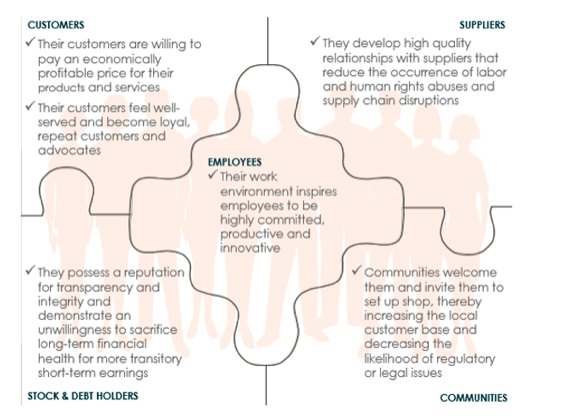By Andrew Little, Research Analyst with Global X ETFs
The COVID-19 pandemic highlights the importance of a consistent and responsible approach to corporate decision making.
When the going is good, companies face fewer unexpected challenges and difficult decisions. In 2019, the S&P 500 reached all-time highs and profitability soared. This type of environment lends itself to a surge in stakeholder-friendly policies like giving employees extra vacation days or making charitable donations to communities.
Such policies can be the natural evolution of companies seeking to introduce new long-term commitments to their stakeholders. On the other hand, companies may enact such policies to boost their brand reputation in the short-term or to temporarily appease certain contingents. While it can be difficult to determine a company’s true intentions when times are good, in times of crisis or economic stress they become apparent.
Amid the ensuing shutdown of major segments of the global economy, companies find themselves on substantially weaker footing. They face difficult business decisions around finances, operations, and personnel. Many companies make these decisions with grace, working within their economic constraints to continue to support key stakeholders. Others, that perhaps mere months ago championed stakeholder interests, may now approach decision making with a short-term, profit-driven mentality.
Sustainable investing is an approach that seeks to identify companies that demonstrate a conscious commitment to each of their key stakeholders: employees, customers, suppliers, investors, and local communities. This means that at both market highs and lows, their policies are of the same flavor.
While no business is perfect, and economic realities can strain budgets and shift priorities, sustainable companies will continue to uphold these ideals to the best of their abilities. And in the long-run, those that implement such policies could positively impact the world, while also adding value to their businesses. (See: How Sustainable Investing Can Create Long-Term Value).
Characteristics of Conscious Companies

The methodology behind the Global X Conscious Companies ETF (KRMA) presents a framework identifying sustainable companies. Security selection is determined by Concinnity Advisors’ multi-stakeholder operating system, targeting the companies that best achieve positive outcomes for customers, employees, suppliers, investors, and communities. Below we explore how some companies currently held in KRMA are interacting with stakeholders affected by the crisis:
Customers
Alphabet announced that they will provide up to $340M worth of Google Ad credits to small- and medium-sized businesses that can be used through the end of 2020. Many of these businesses face immense economic hardships due to the market downturn. Free advertising helps businesses sell their products and services, providing income to businesses owners and their employees. Further, it facilitates commerce at a time of much needed economic stimulus.1
Comcast announced that for the next 60 days, they will provide free WiFi hotspots for everyone including non-customers, pause internet data limits, stop service disconnects and waive late fees for certain customers. Internet access is vital for those who work remotely and keeps us connected at time when social distancing isolates from each other, so these efforts are especially meaningful.2
Eli Lilly offers free drive-through SARS-CoV-2 testing in Indiana for front-line health workers, essential workers like grocery store employees, and to those aged 65+ exhibiting symptoms. While a physician’s approval is still required for testing, Eli Lilly’s initiative takes pressure off of their traditional customers in the health care sector and should help limit the spread of COVID-19 in the Indiana community where they are based.3 Additionally, Eli Lilly contacted customers who rely on their insulin for diabetes management and offered assistance to those who may not be able to afford their medication due to COVID-19 related economic impacts.4
Employees
Lowe’s increased wages by $2 an hour for every full-time, part-time, and seasonal hourly associate for the hours they work through the month of April. Additionally, Lowe’s offered employees a one-time $300 payment ($150 for part-time) to help employees deal with the economic hardships presented by the crisis and opened in-store food pantries for employees. They also offer 14-days of emergency leave for all associates, regardless of circumstance, extended telemedicine benefits, and access to masks and gloves.5
Home Depot announced that they are distributing thermometers to employees in stores and distribution centers. Further, they announced expanded benefits for associates including up to 80 additional hours of paid time off for workers under 65, 160 hours of paid time off for workers over 60, and 14 days paid time off for employees required to quarantine.6 As an essential business, Home Depot must remain open in many areas, but these efforts help protect employees from infection and provide income to those who depend on it.
Pepsi offers two weeks of paid sick leave for employees who need to quarantine or look after those who require care and will provide 2/3 pay for an additional 10 weeks following. Further, they offer 12 weeks of full pay for any employees not able to work due to facility closures.7
Communities
Proctor and Gamble (P&G) has committed $15M of product and in-kind support so far, but their efforts go beyond monetary amounts. Their brands manufacture products that are key to personal care and public health. With this in mind, P&G introduced new lines of hand sanitizer production in manufacturing centers around the world and are working to produce face masks that will go to hospitals, first responders, and employees.8
Verizon tripled data limits for Verizon Innovative Learning Schools and committed $10M to support students and health care workers. Additionally, Verizon is teaming up with Faze Clan, one of the world’s most popular esports organizations to stream music, gaming and comedy events to support local businesses. Viewers can tune into the events on Twitch and use the hashtag #PayitForwardLIVE to direct additional funds to local communities.9
Nvidia will provide researchers free access to their Parabricks Genomics Analysis Toolkit which accelerates the analysis of genomic sequencing data by up to 50x.10 While it is difficult to affix a monetary value to this, such a commitment could prove extremely valuable in developing treatments to COVID-19, positively impacting communities across the world.
Conclusion
Our examination should not be taken as a condemnation of companies that had no choice in making difficult cost-cutting decisions. Nor should it be taken as an endorsement of the companies we discussed above. Instead, the crisis we face presents a real-time case study for sustainable investing – examining how companies respond to crisis, how they prioritize difficult decisions, and what the long-term impact of such decisions may be.
Photo Credit: Gael Varoquaux via Flickr Creative Commons
This article first appeared on April 13 on the Global X ETF blog
FOOTNOTES
1. Google, “COVID-19: $800+ million to support small businesses and crisis response,” March 7, 2020.
2. Comcast, “Comcast Announces Comprehensive COVID-19 Response to Help Keep Americans Connected to the Internet,” March 13, 2020.
3. Eli Lilly and Company, “Lilly to Expand Drive-Through COVID-19 Testing,” April 1, 2020.
4. Eli Lilly and Company, “To Americans Affected By Covid-19 Who Rely On Lilly Insulin,” March, 2020.
5. Lowe’s, “Responding to COVID-19: Serving customers and associates with essential products and services,” April 3, 2020.
6. Home Depot, “Covid-19 Update: How Home Depot Is Responding,” April 1, 2020.
7. Pepsico, “COVID-19,” March 22, 2020.
8. P&G, “Our COVID-19 Response,” March 2020.
9. Verizon, “4/9 Update: Verizon is prepared to serve customers during COVID-19 crisis,” April 9, 2020.
10. Nvidia, “NVIDIA Gives COVID-19 Researchers Free Access to Parabricks,” March 19, 2020.



